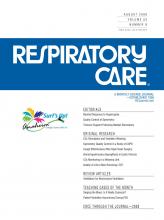Abstract
BACKGROUND: Patients with cystic fibrosis (CF) can become colonized by aspergillus, which can act as an allergen and cause allergic bronchopulmonary aspergillosis (ABPA).
OBJECTIVE: To determine the rate of aspergillus colonization and ABPA in a population of Irish patients with CF.
METHODS: In 50 consecutive patients with CF who presented with exacerbations, we looked for the presence of aspergillus in their sputum and signs and symptoms of ABPA.
RESULTS: Fifteen patients (30%) grew aspergillus species in their sputum cultures. Six patients (12%) had ABPA. Matched for age, sex, genotype, and microbiology, there was no significant difference in forced expiratory volume in the first second (percent predicted, FEV1%) in subjects with aspergillus-positive sputum compared to those not colonized with aspergillus. Subjects with ABPA experienced sharp short-term deterioration in lung function (mean 6.7% predicted FEV1), which returned to baseline following at least 4 weeks of treatment.
CONCLUSIONS: The prevalence of ABPA was 12%. Aspergillus-positive sputum of itself was not a poor prognostic sign in terms of lung function over the 5-year study course. ABPA produces short-term reversible declines in lung function and responds to treatment. The frequency of aspergillus isolates did not correlate with the occurrence of ABPA. A low threshold for the diagnosis of ABPA should be maintained in any patient with CF who does not improve with antibiotics.
Footnotes
- Correspondence: Sanjay Haresh Chotirmall MB BCh BAO MRCPI MRCP(UK), Department of Respiratory Medicine, Beaumont Hospital. Dublin 1, Republic of Ireland. E-mail: sanjaychotirmall{at}hotmail.com.
- Copyright © 2008 by Daedalus Enterprises Inc.







